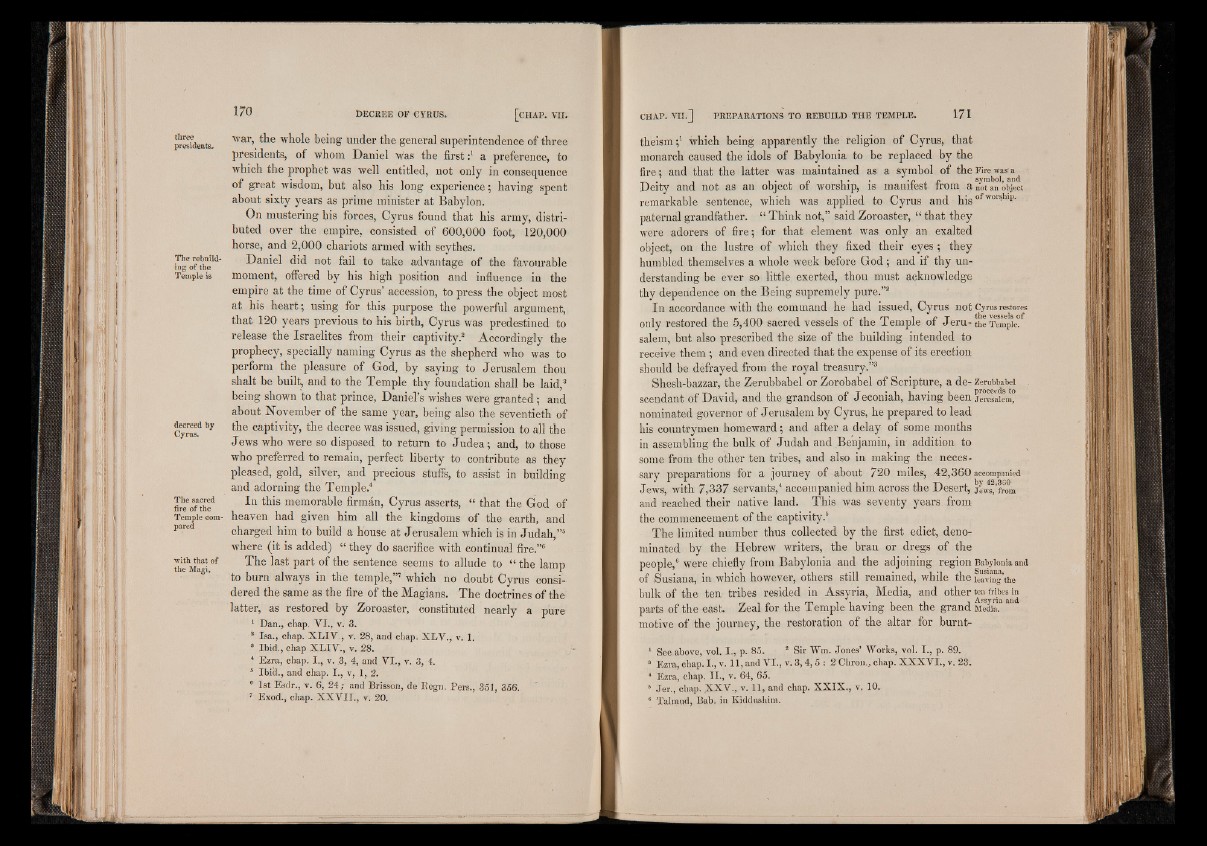
three
presidents.
The rebuilding
of the
Temple is
decreed by
Cyrus.
The sacred
fire of the
Temple compared
■with that of
the Magi*
war, the whole being under the general superintendence of three
presidents, of whom Daniel was the first i a preference, to
which the prophet was well entitled, not only in consequence
of great wisdom, but also his long experience; having spent
about sixty years as prime minister at Babylon.
On mustering his forces, Cyrus found that his army, distributed
over the empire, consisted of 600,000 foot, 120,000
horse, and 2,000 chariots armed with scythes.
Daniel did not fail to take advantage of the favourable
moment, offered by his high position and influence in the
empire at the time of Cyrus’ accession, to press the object most
at his heart; using for this purpose the powerful argument,
that 120 years previous to his birth, Cyrus was predestined to
release the Israelites from their captivity.8 Accordingly the
prophecy, specially naming Cyrus as the shepherd who was to
perform the pleasure of God, by saying to Jerusalem thou
shalt be built, and to the Temple thy foundation shall be laid,3
being shown to that prince, Daniel’s wishes were granted; and
about November of the same year, being also the seventieth of
the captivity, the decree was issued, giving permission to all the
Jews who were so disposed to return to Judea; and, to those
who preferred to remain, perfect liberty to contribute as they
pleased, gold, silver, and precious stuffs, to assist in building
and adorning the Temple.4
In this memorable firmán, Cyrus asserts, “ that the God of
heaven had given him all the kingdoms of the earth, and
charged him to build a house at Jerusalem which is in Judah,”5
where (it is added) “ they do sacrifice with continual fire.”6
The last part of the sentence seems to allude to “ the lamp
to burn always in the temple,”7 which no doubt Cyrus considered
the same as the fire of the Magians. The doctrines of the
latter, as restored by Zoroaster, constituted nearly a pure
1 Dan., chap. V I., v. 3.
8 Isa., chap. X L IV ., v. 28, and chap. XLV., v. 1.
8 Ibid., chap X L IV ., v. 28.
1 Ezra, chap. I., v. .3, 4, and V I., v. 3, 4.
5 Ibid., and chap. I., v, 1, 2.
8 1st Esdr., v. 6, 2 4 ; and Brisson, de Begn. Pers., 351, 356.
7 Exod., chap. X X V I I ., v. 20.
theism;1 .which being apparently the religion of Cyrus, that
monarch caused the idols of Babylonia to be replaced by the
fire; and that the latter was maintained as a symbol of the Fire w a s ' •
Deity and not as au object of worship, is manifest from a not an object
remarkable sentence, which was applied to Cyrus and Bisofwor^hlP-
paternal grandfather. “ Think not,” said Zoroaster, “ that they
were adorers of fire; for that element was only an exalted
object, on the lustre of which they fixed their eyes; they
humbled themselves a whole week before God; and if thy understanding
be ever so little exerted, thou must acknowledge
thy dependence on the Being supremely pure.”8
In accordance with the command he had issued, Cyrus not Cyrus restores
only restored the 5,400 sacred vessels of the Temple of Jeru- the Temple,
salem, but also prescribed the size of the building intended to
receive them; and even directed that the expense of its erection
should be defrayed from the royal treasury.”3
Shesh-bazzar, the Zerubbabel or Zorobabel of Scripture, a de- Zembbabei
scendant of David, and the grandson of Jeconiah, having been Jerusalem,
nominated governor of Jerusalem by Cyrus, he prepared to lead
his countrymen homeward; and after a delay of some months
( in assembling the bulk of Judah and Benjamin, in addition to some from the other ten tribes, and also in making the necessary
preparations for a journey of about 720 miles, 42,360 accompanied
■ Jews, with 7,337 servants,4 accompanied him across the Desert, jL^’from
and reached their native land. This was seventy years from
the commencement of the captivity.5
The limited number thus collected by the first edict, denominated
by the Hebrew writers, the bran or dregs of the
people,6 were chiefly from Babylonia and the adjoining region Babylonia and
of Susiana, in which however, others still remained, while the ieav!ng’the
bulk of the ten tribes resided in Assyria, Media, and other ten fribes in
parts of the east. Zeal for the Temple having been the grand Media? au
motive of the journey, the restoration of the altar for burnt-
1 See above, vol. I., p. 85. 8 Sir f m . Jones’ Works, vol. I ., p. 89.
8 Ezra, chap. I., v. 11, and V I., v. 3,4 , 5 : 2 Chron., chap. X X X V I., v. 23.
4 Ezra, chap. II., v. 64, 65.
5 Jer., chap. X X V ., v. 11, and chap. X X IX ., v. 10.
8 Talmud, Bab. in Kiddushim.